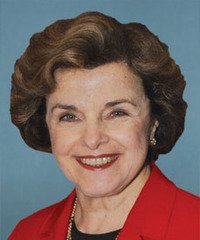
As California’s senior Senator, Dianne Feinstein has built a reputation as an independent voice, working hard to find commonsense solutions to problems facing California and the nation.
Since her election to the Senate in 1992, Senator Feinstein has built a significant record of legislative achievements across a wide range of issues.
Senator Feinstein led a bipartisan group of senators in passing legislation to drastically increase the fuel efficiency of cars. She was a leading voice in the effort to legalize gay marriage and ensure rights for LGBT Americans. She’s a champion for the preservation of the Mojave Desert, Lake Tahoe and California’s forests. She helped create the nationwide AMBER Alert network, passed bills to criminalize border drug tunnels and has long focused on improving California’s water infrastructure and reducing the threat of wildfires. She also continues to advocate for commonsense gun laws.
Senator Feinstein has a proven record of fighting to protect our climate and eliminate harmful greenhouse gases. California knows all too well the dangers that climate changes poses. From worsening wildfires to longer droughts, we’re already experiencing the negative effects of climate change. Senator Feinstein supports reducing our carbon footprint through efficient technologies, reducing vehicle emissions to zero and investing in renewable energy sources.
Through her role as chair of the Energy and Water Appropriations Subcommittee, Senator Feinstein works to increase funding for clean energy programs. California is the largest producer of geothermal and solar energy in the country, demonstrating that it is possible to successfully address climate change while improving infrastructure and maintaining economic growth.
Vehicle emissions
Vehicle emissions are one of the largest driving factors of climate change. The Ten-In-Ten Fuel Economy Act, authored by Senators Feinstein, Snowe, Inouye and Stevens, was signed into law in 2007. The law required average fuel economy standards for America’s fleet of vehicles to increase by at least 10 mpg over 10 years, and then to continue to increase to be as strong as technologically feasible. This led to the largest increase in fuel efficiency in more than two decades. In 2019, after the Trump administration attempted to roll back federal fuel economy standards, Senator Feinstein successfully led an effort committing all major automakers to sign an agreement with California to voluntarily commit to stronger fuel economy standards than the federal level. Senator Feinstein strongly supports Governor Newsom’s 2020 executive order requiring all new vehicles sold in California to be zero-emission by 2035.
Electric vehicles
California is at the forefront of the transition to cleaner modes of transportation. Senator Feinstein is strong supporter of the growing fleet of electric cars and is a cosponsor of the Electric Cars Act, which would extend the electric vehicle tax credit for an additional 10 years. This bill would also allow buyers to use the tax credit over a 5-year period, or apply the credit at the point of sale, making the credit more applicable to those without large tax liability. In 2021, Senator Feinstein introduced the Affordable EVs for Working Families Act, which would provide buyers of preowned electric cars with tax rebates up to $2,500.
Fossil fuel drilling
Fossil fuels are the main driver of climate change and we must do all we can to end our dependence on them. Not only do fossil fuels pollute when they are burned, but they also damage the environment when being mined or drilled for. Senator Feinstein is the author of the West Coast Ocean Protection Act, which would permanently ban offshore oil and gas drilling off the coasts of California, Oregon and Washington. She voted against the Keystone XL pipeline in 2014 and opposes opening the Arctic National Wildlife for drilling. In 2012, the Pipeline Safety, Regulatory Certainty and Job Creation Act was signed into law to address safety concerns about the 2.5 million miles of oil, natural gas and hazardous liquid pipelines in the United States. This bill reflected many of the safety, inspection and enforcement provisions in an earlier bill introduced by Senators Feinstein and Boxer in the wake of the 2010 San Bruno gas explosion.